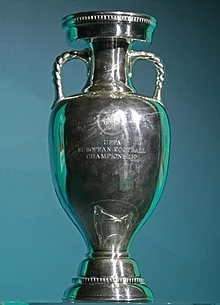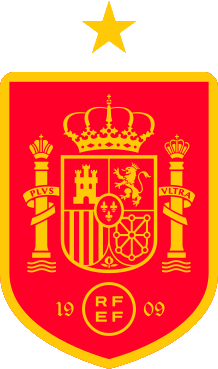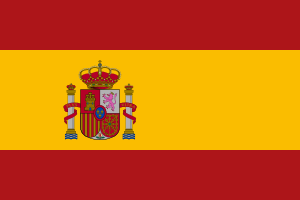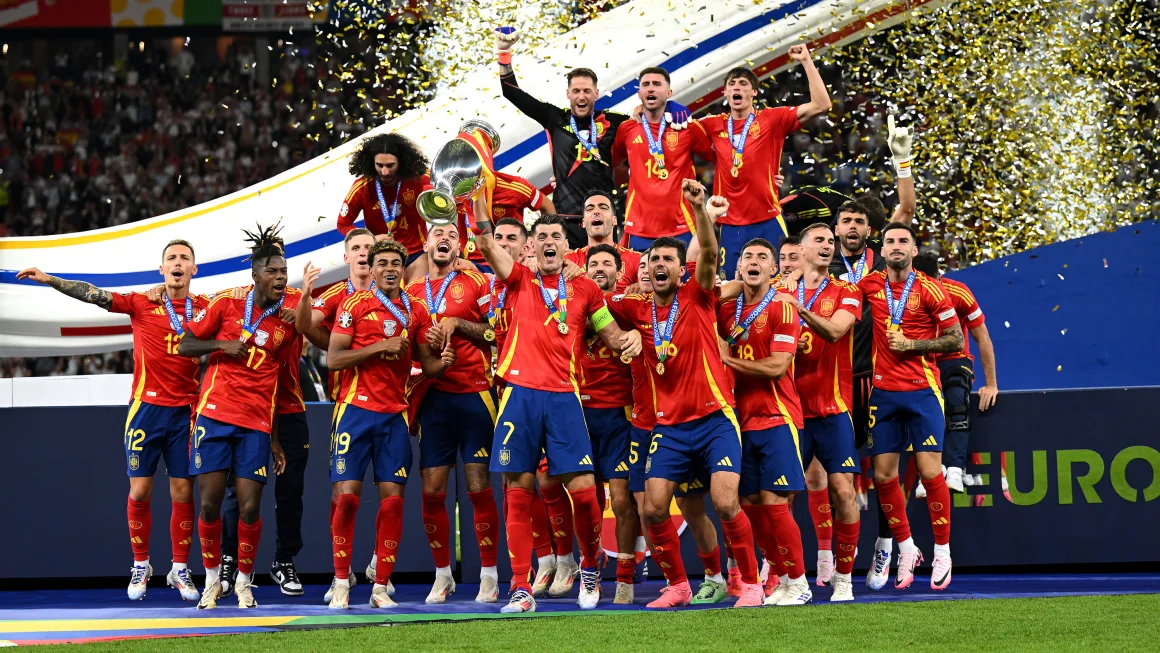UEFA EUROPEAN CHAMPIONSHIPS

The UEFA European Football Championship, less formally known as the European Championship or the Euros, is the primary association football championship tournament organised by the Union of European Football Associations (UEFA). The competition is contested by UEFA members' senior men's national teams, determining the continental champion of Europe. It is the second-most watched football tournament in the world after the FIFA World Cup. The Euro 2016 final was watched by a global audience of around 600 million.
The competition has been held every 4 years since 1960, except for 2020 when it was postponed until 2021 due to the Covid-19 global pandemic. Scheduled to be in the even-numbered years between the FIFA World Cup tournaments, it was originally called the European Nations' Cup before changing to its current name in 1968.
Before entering the tournament, all teams other than the host nations (which qualify automatically) compete in a qualifying process. Until 2016, the championship winners could compete in the following year's FIFA Conferderations Cup, but were not obliged to do so. From the 2020 edition, the winner competes in the CONMEBOL-UEFA Cup of Nations.
Here is the list of winners:
| Country | Number of wins | Years won | |
| Spain | 4 | 1964, 2008, 2012, 2024 | |
| Germany | 3 | 1972, 1980, 1996 | |
| Italy | 2 | 1968, 2020 | |
| France | 2 | 1984, 2000 | |
| Soviet Union | 1 | 1960 | |
| Czechoslovakia | 1 | 1976 | |
| Netherlands | 1 | 1988 | |
| Denmark | 1 | 1992 | |
| Greece | 1 | 2004 | |
| Portugal | 1 | 2016 |
Current holders:
SPAIN



History: Beginnings
Regional tournaments for national teams existed before the advent of a truly pan-European competition. Starting in 1883, the British Home Championship was an annual competition contested between the United Kingdom's four national teams (England, Scotland, Wales, Ireland / Northern Ireland). Until these national teams entered the FIFA World Cup in 1950, it was the most important national tournament these nations competed in.
Similarly, from 1927 until 1960, the Central European International Cup was held six times. It brought together the national teams of Austria, Hungary, Italy, Czechoslovakia, Switzerland and Yugoslavia.
The idea of a pan-European football tournament was first proposed by the French Football Federation's secretary-general Henri Delaunay in 1927, but it was until until 1958 that the tournament was started, three years after Delaunay's death. In honour of Delaunay, the trophy awarded to the champions is named after him.
The 1960 tournament which was held in France, had four teams competing in the finals out of 17 that entered the competition. It was won by the Soviet Union, beating Yugoslavia 2-1 in a tense final in Paris. Spain withdrew from its quarter-final match against the Soviet Union because of two political protests. Of the 17 teams that entered the qualifying tournament, notable absentees were England, the Netherlands, West Germany and Italy.
Spain held the next tournament in 1964, which saw an increase in entries to the qualification tournament, with 29 entering. West Germany continued to be a notable absentee and Greece withdrew after being drawn against Albania, with whom they were still at war. The hosts beat the title holders, the Soviet Union, 2-1 at the Santiago Bernabeu Stadium in Madrid.
The tournament format stayed the same for the 1968 tournament, hosted and won by Italy. For the first and only time, a match was decided on the toss of a coin (which was the semi-final between Italy and the Soviet Union). The final went to a replay after the match against Yugoslavia finished 1-1. Italy won the replay 2-0. More teams entered this tournament (31).
Belgium hosted the 1972 tournament, which West Germany won, beating Soviet Union 3-0 in the final, with goals coming from Gerd Muller (2) and Herbert Wimmer at the Heysel Stadium in Brussels. The tournament would provide a taste of things to come as the German side contained many of the key members of the 1974 FIFA World Cup winning team.
The 1976 tournament in Yugoslavia was the last in which only four teams took part in the final tournament, and the last in which the hosts had to qualify. Czechoslovakia beat West Germany in the newly introduced penalty shoot-out. After seven successful conversions, Uli Hoeness missed, leaving Czech Antonin Panenka with the opportunity to score and win the tournament. An "audacious" chipped shot, described by UEFA as "perhaps the most famous spot kick of all time" secured the victory as Czechoslovakia won 5-3 on penalties.
Expansion to 8 teams
The competition was expanded to 8 teams for the 1980 tournament, again hosted by Italy. It involved a group stage, with the winners for the groups going on to contest the final, and the runners-up playing in a third place play-off. West Germany won their second European title by beating Belgium 2-1, with both goals scored by Horst Hrubesch at the Stadio Olimpico in Rome.
France won their first major title at home in 1984, with their captain Michel Platini scoring 9 goals in just 5 games, including the opening goal in the final, in which they beat Spain 2-0. The format also changed, with the top two teams in each group, going through to the semi-final stage, instead of the winners of each group going straight to the final. The third-place play-off was abolished.
West Germany hosted Euro 1988, but lost 2-1 to the Netherlands, in the semi-finals, which sparked vigorous celebrations in the Netherlands. The Netherlands went on to win the tournament in a rematch of their first game of the group stage, beating the Soviet Union 2-0 at the Olympic Stadium in Munich. Marco van Basten scored the second goal, a volley over the keeper from the right wing which is often considered one of the best goals ever scored.
Euro 1992 was held in Sweden and was won by Denmark, who were only in the finals after UN Sanctions prevented Yugoslavia's participation as some of the states constituting the Socialist Federal Republic of Yugoslavia were at war with each other. The Danes beat holders the Netherlands on penalties in the semi-finals, then defeated FIFA World Cup champions Germany in the final, 2-0. This was the first tournament in which a unified Germany took part and also the first major tournament to have the players' names printed on their backs.
Expansion to 16 teams
England hosted Euro 96, the first tournament to use the nomenclature "Euro [year]" and would see the number of teams taking part, double to 16. The hosts, in a replay of the 1990 FIFA World Cup semi-final, were knocked out on penalties by Germany. The surprise team of the tournament was the newly formed Czech Republic, pariticipating in its first international competition following the dissolution of Czechoslovakia, which reached the final after beating Portugal and France in the knock-out stages. Germany would go on to to win the final 2-1 thanks to the first "golden goal" ever in a major tournament, scored by Oliver Bierhoff, five minutes into extra time. This was Germany's first title as a unified nation.
Euro 2000 was the first tournament to be held by two countries in the Netherlands and Belgium. France, the reigning FIFA World Cup champions, were favoured to win and they lived up to expectations to beat Italy 2-1 after extra time, having come from 1-0 down. Sylvain Wiltord equalised in the last minute of normal time and David Trezeguet scored the winning goal in extra time.
Euro 2004, like 1992, produced an upset. Greece, who had only ever qualified for one FIFA World Cup (1994) and one European Championship (1980) before, beat the hosts Portugal 1-0 in the final with a goal scored by Angelos Charisteas in the 57th minute to win a tournament that they had been given odds of 150-1 to win before the tournament began. On their way to the final, they beat the holders France as well as the Czech Republic with a silver goal, a rule which replaced the previous golden goal in 2003, before being abolished itself shortly after this tournament.
The 2008 tournament, hosted by Austria and Switzerland, marked the second time that two nations co-hosted and the first edition where the new trophy was awarded. It commenced on 7 June and finished on 29 June. The final between Germany and Spain was held at the Ernst Happel Stadion in Vienna. Spain defeated Germany 1–0, with a goal scored by Fernando Torres in the 33rd minute, sparking much celebration across the country. This was their first title since the 1964 tournament. Spain were the highest scoring team with 12 goals scored and David Villa finished as the top scorer with four goals. Xavi was awarded the player of the tournament, and nine Spanish players were picked for the team of the tournament.
The UEFA Euro 2012 tournament was co-hosted by Poland and Ukraine. Spain defeated Italy 4–0 in the final, thus becoming the first nation to defend a European Championship title, as well as the first European team to win three consecutive major tournaments. In scoring the third goal of the final, Torres became the first player to score in two European Championship finals. He was equal top scorer for the tournament with three goals in total, along with Mario Balotelli, Alan Dzagoev, Mario Gómez, Mario Mandžukić, and Cristiano Ronaldo, despite only being used as a substitute player. The tournament was otherwise notable for having the most headed goals in a Euro tournament (26 out of 76 goals in total); a disallowed goal in the England versus Ukraine group game which replays showed had crossed the goal line, and which prompted President of FIFA Sepp Blatter to tweet, "GLT (Goal-line technology) is no longer an alternative but a necessity", thus reversing his long-held reluctance to embrace such technology; and some crowd violence in group games.
Expansion to 24 teams
In 2007, the Football Association of Ireland and Scottish Football Association proposed the expansion of the tournament, which was later confirmed by the UEFA Executive Committee in September 2008. Out of the 54 member associations of UEFA, only three, including England and Germany, opposed the expansion. On 28 May 2010, UEFA announced that UEFA Euro 2016 would be hosted by France. France beat bids of Turkey (7–6 in voting in the second voting round) and Italy, which had the fewest votes in the first voting round. Euro 2016 was the first to have 24 teams in the finals. This was the third time France have hosted the competition. Portugal, which qualified for the knock-out phase despite finishing third in its group, went on to win the championship by defeating heavily favoured host team France 1–0 in the final, thanks to a goal from Eder in the 109th minute. Cristiano Ronaldo, Portugal's world-renowned striker, came out of the game due to injury in the 25th minute. This was the first time Portugal won a major tournament.
For the 2020 tournament, three bids were proposed, including a bid from Turkey, a joint bid from the Republic of Ireland, Scotland and Wales, and a joint bid from Georgia and Azerbaijan. In December 2012, however, UEFA announced that the 2020 tournament would be hosted in several cities in various countries across Europe, with the semi-finals and final being played in London. The venues were selected and announced by UEFA on 19 September 2014. However, Brussels was removed as a host city on 7 December 2017 due to delays with the building of the Eurostadium. On 17 March 2020, UEFA announced that Euro 2020 would be delayed by a year due to the COVID-19 pandemic in Europe, and proposed it take place from 11 June to 11 July 2021. The competition was postponed in order to reduce pressure on the public services in affected countries and to provide space in the calendar for the completion of domestic leagues that had been suspended. Before the Euro 2020, Dublin was also removed as one of the host cities due to its inability to guarantee spectators to the stadium, while Bilbao was replaced by Seville for the same reason. In the final, Italy defeated maiden finalists England 3–2 on penalties, after the game was tied 1–1 after extra time, to win their second European Championship.
Trophy
The Henri Delaunay Trophy, which is awarded to the winner of the European Championship, is named in honour of Henri Delaunay, the first General Secretary of UEFA, who came up with the idea of a European championship but died five years before the first tournament in 1960. His son Pierre was in charge of creating the trophy. Since the first tournament it has been awarded to the winning team for them to keep for four years, until the next tournament. This trophy bore the words Coupe d'Europe ("European Cup"), Coupe Henri Delaunay ("Henri Delaunay Cup"), and Championnat d'Europe ("European Championship") on the front and a juggling boy on the back.
For the 2008 tournament, the Henri Delaunay Trophy was remodelled to make it larger, as the old trophy was overshadowed by UEFA's other trophies such as the new European Champion Clubs' Cup. The new trophy, which is made of sterling silver, now weighs 8 kilograms (18 lb) and is 60 centimetres (24 in) tall, being 2 kilograms (4.4 lb) heavier and 18 centimetres (7.1 in) longer than the old one. The marble plinth that was serving as base was removed. The new silver base of the trophy had to be enlarged to make it stable. The names of the winning countries that had appeared on the plaques glued to the plinth are now engraved on the back of the trophy, under the word Coupe Henri Delaunay and are written in English rather than French its predecessor had. The 1972 and 1980 winning country, West Germany, is written as just Germany. Since 2016, the juggling boy was returned on the trophy's back.
The players and coaches of the winning team and the runner-up team are awarded gold and silver medals, respectively. Each association that competes in the final tournament receives a commemorative plaque. Each time the team losing semi-finalist, as well as each finalist, receive a dedicated plaque. Though there is no longer a third place play-off, UEFA decided in the 2008 edition to award the semi-final losers (Turkey and Russia) bronze medals for the first time, and did the same in the 2012 edition when Germany and Portugal received bronze medals. However, UEFA decided that losing semi-finalists would no longer receive medals from the 2016 edition onwards. Bronze medals were previously awarded for winners of the third place play-off, the last of which was held in 1980.
Qualifying
To qualify, a team must finish in one of the direct qualifying spots or win a play-off. After this, a team proceeds to the finals round in the host country, although hosts qualify for the tournament automatically.
The groups for qualification are drawn by a UEFA committee using seeding. Seeded teams include reigning champions and other teams based on their performance in the preceding FIFA World Cup qualifying and the last European Championship qualifying.
To obtain an accurate view of the teams' abilities, a ranking is produced. This is calculated by taking the total number of points won by a particular team and dividing it by the number of games played, i.e. points per game. In the case of a team having hosted one of the two previous competitions and therefore having qualified automatically, only the results from the single most recent qualifying competition are used. If two teams have equal points per game, the committee then bases their positions in the rankings on:
- Coefficient from the matches played in its most recent qualifying competition.
- Average goal difference.
- Average number of goals scored.
- Average number of away goals scored.
- Drawing of lots.
The qualifying phase is played in a group format, the composition of the groups is determined through means of a draw of teams from pre-defined seeded bowls. The draw takes place after the preceding World Cup's qualifying competition. For UEFA Euro 2020, the group qualifying phase consisted of ten groups; five of six teams and the remainder of five teams each.
Each group is played in a league format with teams playing each other home and away. The top two teams then qualified for the final tournament, with remaining places decided by playoffs depending on their ranking in the UEFA Nations League. As with most leagues, the points are awarded as three for a win, one for a draw, and none for a loss.
In the eventuality of one or more teams having equal points after all matches have been played, the following criteria are used to distinguish the sides:
- Higher number of points obtained in the group matches played among the teams in question.
- Superior goal difference from the group matches played among the teams in question.
- Higher number of goals scored in the group matches played among the teams in question.
- Higher number of goals scored away from home in the group matches played among the teams in question.
- Results of all group matches:
- Superior goal difference
- Higher number of goals scored
- Higher number of goals scored away from home
- Fair play conduct.
- Drawing of lots.
Results
For each of the year's results (including qualifying), select from the links below:
| 1960 | 1964 | 1968 | 1972 | 1976 | 1980 | 1984 | 1988 | 1992 |
| 1996 | 2000 | 2004 | 2008 | 2012 | 2016 | 2020 | 2024 | 2028 |
For each country's results and goalscorers, select this link.





